
Starting a summer camp is exciting, but learning how to start and run a summer camp successfully requires careful planning, smart systems, and the right team to ensure every day runs smoothly.
In this guide, we’ll walk you through the exact steps to launch and operate a successful summer camp, from planning and licensing to hiring staff, marketing programs, and managing registration with confidence.
Author’s note: I’m Olivier, and I share tips and tricks that I’ve learned over the last decade as the owner of a youth sports program. Today, as the co-founder of Activity Messenger, I help summer camps across North America streamline operations, improve communication, and increase revenue.
Before choosing a name, designing programs, or building a website, it’s important to ask one honest question: Is running a summer camp the right business for you?
Many first-time camp owners underestimate the time, energy, and responsibility involved. During peak season, you’re managing staff, responding to parents, handling logistics, and ensuring every child is safe and engaged all at once.
Imagine this:
It’s 8:15 a.m. on your first day. A counsellor calls in sick. Two parents have questions about allergies. Another camper forgot their lunch. Registration forms are incomplete. And pickup starts in eight hours.
This is normal. Successful camp owners aren’t the ones who avoid these moments. They’re the ones who prepare for them.
Before moving forward, consider:
If the answer is yes, you’re in the right place. Let’s build your camp the right way.
📌 Read More: Activity Messenger offers a variety of blog articles and informative videos to help you plan, market, and manage your summer camp more efficiently.
💡 See It in Action: Request a free demo to learn how Activity Messenger can simplify registration, automate waivers, track attendance, and streamline communications, so you can focus on delivering an exceptional experience for campers.

A business plan is your roadmap to success when starting a summer camp. It should clearly outline what needs to be done before and after the camp’s launch to ensure its success.
Mission and Vision: Define the purpose of your camp beyond making a profit. For example, to provide a safe and fun environment where children can learn, grow, and make lasting friendships through outdoor activities, creative programs, and teamwork.
Market Analysis: Identify your target audience, including your prospective campers’ ages, interests, and locations. Research local competitors, understand what they offer, and identify gaps in the market that you can fill, such as unique themes or specialized programs.
Programs Offered: Decide on the types of activities your camp will offer, such as arts and crafts, sports, outdoor adventures, STEM programs, or specialized camps like theatre or coding.
Pricing: Set prices that are competitive. Consider tiered options or bundles, such as weekly rates, sibling discounts, or early bird specials, to attract a wider audience.
Marketing Strategy: Develop a plan to attract and retain campers, including social media campaigns, partnerships with local businesses, referral programs, and open house events.
Financial Plan: Detail your start-up costs, ongoing expenses, projected revenue, and break-even analysis. This is essential for securing funding or attracting investors to support your vision.
A decision that can greatly affect the success of your summer camp is choosing the right location.
Mini-Scenario: You pick a local school gym for your camp, only to discover there’s a competing camp nearby that fills first. Families complain about limited parking, and counsellors waste time walking between activity areas.
Here are a few options to consider:
Renting space in community centers, schools, or other local facilities can significantly reduce your startup costs. These locations often have the infrastructure you need, such as gyms, outdoor fields, and classrooms, making it easier to offer a variety of activities.
Partnering with established venues can also help you tap into their existing audiences. Negotiate terms that ensure you have adequate access to the space for your camp’s schedule and activities.

If you’re ready to make a larger financial commitment, building your own camp facility gives you complete control over how your camp operates. You can tailor it to your unique programs, whether it’s outdoor adventure, sports, arts, or STEM activities. Planning is key, from securing funding to designing a facility that meets local zoning, safety, and environmental regulations. With your own facility, you can create a distinctive, purpose-built environment that sets your camp apart.
Mobile camps allow you to deliver your programs in a variety of locations, such as parks, community centers, or even private backyards. This model eliminates the overhead of maintaining a permanent location while providing flexibility for you and your clients. Mobile camps work well for families who value convenience and personalized programming. However, strong logistical planning and targeted marketing are essential to ensure consistent enrolment. This option is ideal for those looking to start small with a low initial investment.

Franchising is an excellent way to enter the summer camp industry with a proven model. Look for franchises that offer strong support, including marketing assistance, operational training and a structured curriculum. Franchisors like Mad Science and Bricks 4 Kidz are known for their turnkey solutions and proven programs. Franchises often offer ongoing support to maintain quality and streamline operations, increasing your chances of success.
Compliance is a critical element in building trust and credibility with families who enrol in your summer camp.
Mini-Scenario: A parent asks for proof that your counsellors are CPR certified. Without clear documentation, they hesitate to enrol, and a competitor wins their registration.
Here are the key areas of compliance to consider when starting your camp:
To legally operate a summer camp, you’ll need to obtain the appropriate business license or permit from your local city or county. Requirements can vary by location, so it’s important to check with your local government office or website to understand specific regulations.
Maintaining strict health and safety standards is paramount. This includes ensuring that your camp facilities meet all required safety regulations, such as fire codes and sanitation standards. You should also have emergency plans in place and ensure that staff are trained in first aid and CPR to handle incidents effectively.
Having the right insurance coverage is essential to protecting your camp and giving parents peace of mind. Key policies include:
These safeguards protect both your camp operations and the families you serve from unforeseen circumstances.
By addressing these compliance areas, you’ll not only ensure smooth operations, but also build a trustworthy reputation that will attract more families to your camp.

Counsellors and staff are the backbone of your camp. They have a direct impact on the quality of your programs and the overall experience of your campers.
Here’s how to make sure you’re building the right team:
Effectively marketing your summer camp requires an omnichannel approach to reach and convert families. By combining digital and traditional marketing strategies, you can increase awareness and drive enrolment.
Here are some key summer camp marketing ideas:
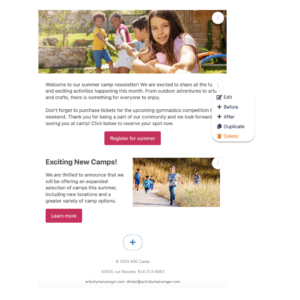

In this webinar, we explore effective ways to utilize marketing efforts to boost camp enrolment, gain valuable testimonials, and spread the word.
Subscribe to our podcast on YouTube to discover the latest tips for running your business. In the episode below, Oli and Will discuss 5 proven marketing strategies to attract more leads, encourage early registrations, and turn your clients into enthusiastic ambassadors.
Business efficiency and the overall customer experience can be greatly improved by incorporating technology into your dance studio.
Mini-Scenario: Parents submit paper waivers at drop-off, forms get lost, and staff spend hours tracking attendance manually. Stress mounts, errors happen, and the camper experience suffers.
An online platform such as Activity Messenger offers a variety of features to help streamline your operations:
Setting up registration forms for camp programs is easy with Activity Messenger. Its intuitive interface simplifies enrolment and reduces administrative tasks by allowing parents to register their children online quickly and efficiently.
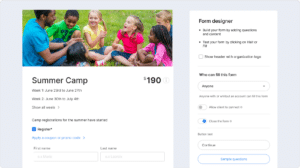
Move liability waivers online with Activity Messenger. Parents can sign waivers digitally during registration to reduce paperwork, minimize errors, and securely store sensitive information. This seamless process enhances the registration experience and saves valuable time for your staff.
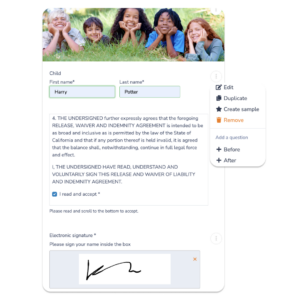
Ensure safety and accountability with an efficient attendance tracking system. Activity Messenger allows counsellors to take attendance digitally, ensuring real-time records that are easily accessible. You can also use QR codes for check-in and check-out, reducing manual errors and improving overall organization. Attendance tracking can be integrated with camper schedules to keep staff informed of each child’s activities throughout the day.
![]()
Simplify the collection and management of important medical information with online camp medical forms. Parents can fill out forms digitally, providing details such as allergies, medications, and emergency contacts. This ensures that staff have instant access to accurate, up-to-date medical information, which can be critical in the event of an emergency. Activity Messenger securely stores this information, keeping it accessible while maintaining privacy standards.
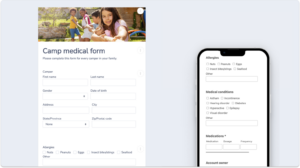
Managing a waitlist manually can be time-consuming, stressful, and prone to mistakes. Automated waitlist systems transform this process, turning potential lost registrations into guaranteed opportunities. With automation:
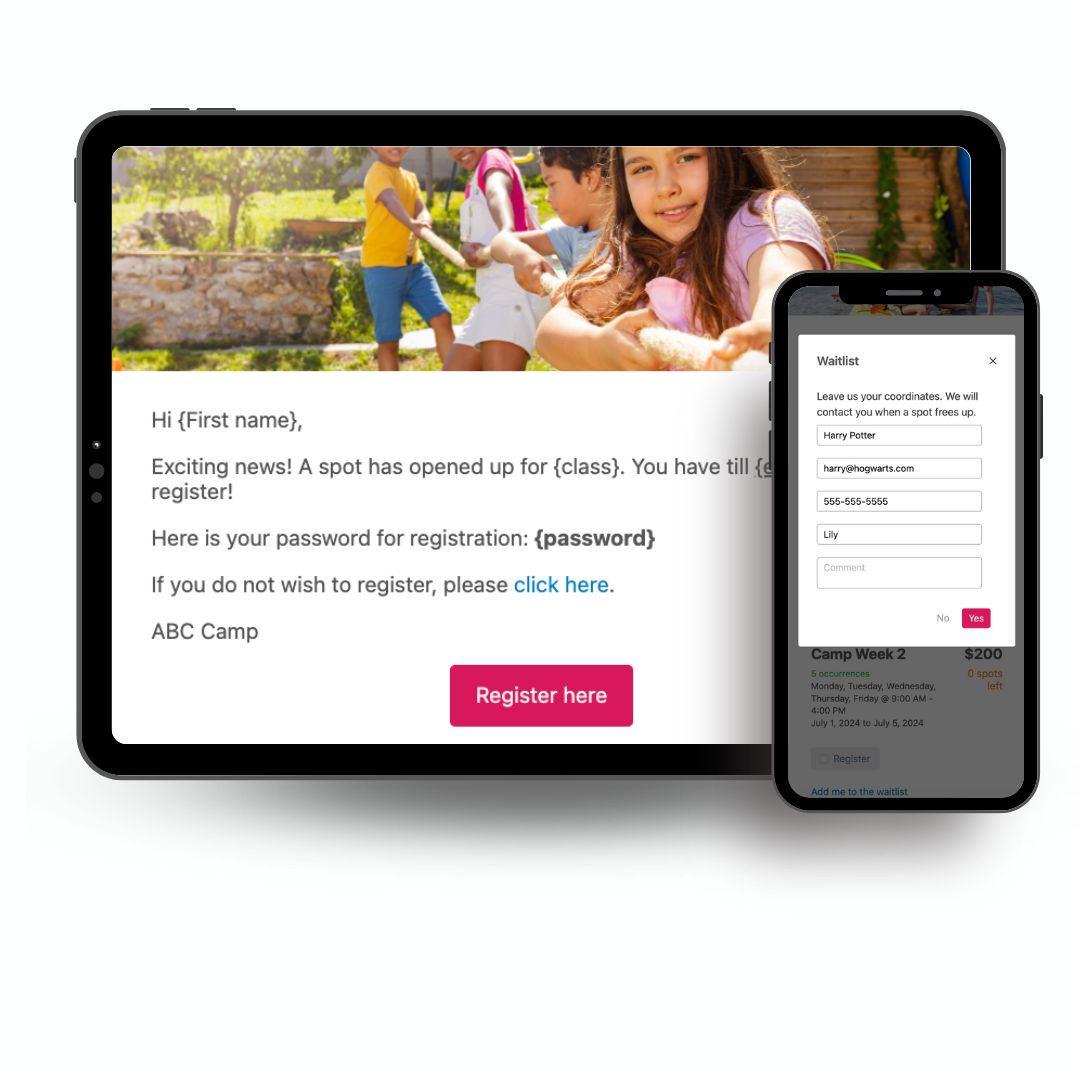
As your camp grows, the need for an advanced camp management software becomes essential. Activity Messenger provides tools for staff scheduling, billing, and managing camper information. With a single dashboard for tracking and analyzing data, you can make informed decisions and focus on delivering a fantastic camp experience. Start small with a basic registration form and scale up with advanced features as your camp grows.
By using these tools, you can save time, reduce administrative burdens, and create an exceptional experience for families. Embracing technology is a powerful step toward running a successful summer camp!
The success and growth of your summer camp depend on responding to local family needs and market trends.
Mini-Scenario: Your camp was fully booked last summer, but this year registration has dropped. Without data, it’s unclear whether parents are unhappy with pricing, programs, or communications.
Here’s how to manage these aspects of your business:
Selecting the right location is crucial for camper safety, accessibility, and program success. Consider renting community spaces, building your own facility, or running mobile camps. Factors like visibility, transportation, parking, and nearby competition will influence enrolment and the overall camper experience.
Popular programs often combine fun, skill-building, and unique experiences. Arts and crafts, STEM activities, sports, outdoor adventures, and specialty camps like theatre or coding are in high demand. Offering diverse options can help your camp appeal to a broader audience and fill more spots.
Camper safety starts with proper licensing, liability insurance, and health certifications for staff. Maintain health and safety protocols, ensure emergency plans are in place, and regularly train counsellors in first aid and CPR. Compliance protects campers, staff, and your camp’s reputation.
Attract motivated counsellors with clear benefits, training opportunities, and a fun, inclusive workplace culture. Retention improves when staff feel recognized, have flexible schedules, and can contribute ideas to programming. Background checks and relevant certifications are essential for safety.
Use a mix of digital and traditional strategies: email campaigns, social media, content marketing, open houses, early-bird promotions, and community events. Highlight what makes your camp unique, such as specialized programs, flexible scheduling, or personalized experiences.
Automated waitlists notify families instantly when spots open, prioritize returning campers or siblings, and integrate seamlessly with registration systems. Personalized alerts reduce frustration and increase conversions, helping you maximize enrolment with minimal staff effort.
Camp management software can simplify registrations, payments, attendance tracking, waiver collection, and staff scheduling. Centralizing these processes saves time, reduces errors, and improves the overall camper experience, allowing staff to focus on programming and engagement.
Collect feedback from campers and parents, monitor finances, and stay informed on industry trends. Experiment with new programs, refine pricing strategies, and track enrolment patterns to make data-driven decisions that increase satisfaction, retention, and revenue.
Running a summer camp is both rewarding and challenging. By planning carefully, hiring the right staff, marketing strategically, and embracing technology, you can create an exceptional experience for campers while keeping your operations organized and efficient.
The camps that thrive year after year are the ones that anticipate challenges, leverage tools like Activity Messenger to automate registration, waivers, attendance, and communication, and continuously adapt based on feedback and trends.
With the right foundation and systems in place, you’ll spend less time on administrative headaches and more time creating a summer your campers and their families will never forget.
📅 Next Step: Book a free demo with Activity Messenger to see how our platform can simplify registration, automate communications, manage your waitlist, and help you run your camp with confidence and deliver an unforgettable experience.